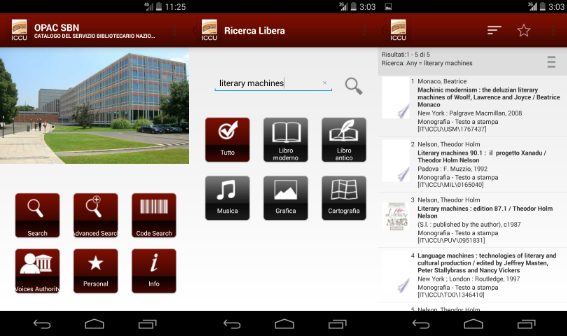Cosa posso usare?
Per poter realizzare le vostre app, siano esse web application, applicazioni native Android, iOS o Windows, abbiamo pensato di identificare una serie di servizi in rete da cui potete attingere le informazioni.
(P.S.: non siete limitati a questi servizi, se ne avete in mente altri :))
OPAC API non ufficiali

Catalogo del servizio bibliotecario nazionale, ecco delle indicazioni su come fare le richieste
Servizi CSBNO
Ecco qui i documenti che descrivono i servizi offerti dal Consorzio Sistema Bibliotecario Nord Ovest
Eventi e news
Nature
Nature è una delle più antiche ed importanti riviste scientifiche esistenti, forse in assoluto quella considerata di maggior prestigio nell'ambito della comunità scientifica internazionale (insieme a Science). Viene pubblicata fin dal 4 novembre 1869.
Non è limitata a soli articoli scientifici, ma ha anche informazioni su eventi.
Le api sono offerte free senza registrazione
http://www.nature.com/developers/documentation/api-references/
Springer
Una delle più grandi case editrici per riviste giornali, libri a carattere scientifico mette a disposizione la collezione di articoli tramite queste due api (serve un nome utente e password, per il resto è free)
Springer metadata API
Provides metadata for over 5 million online documents (e.g. journal articles, book chapters, protocols).
e OpenAccess API
Provides metadata, full-text content, and images for over 80,000 open access articles from BioMed Central and SpringerOpen journals.
Science Direct e Scopus
Da l'accesso alla banca dati delle pubblicazioni presenti su Science Direct e Scopus
Arxiv, Cornell University Library
Open access to 968,455 e-prints in Physics, Mathematics, Computer Science, Quantitative Biology, Quantitative Finance and Statistics
is a highly-automated electronic archive and distribution server for research articles. Covered areas include physics, mathematics, computer science, nonlinear sciences, quantitative biology and statistics. arXiv is maintained and operated by the Cornell University Library with guidance from the arXiv Scientific Advisory Board and the arXiv Sustainability Advisory Group, and with the help of numerous subject moderators.
U.S. National Library of Medicine
NLM (National library of medicine) offers 21 different APIs for accessing various NLM databases.
OpenLibrary
Our goal is to provide a page on the web for every book ever published.
At its heart, Open Library is a catalog. The project began in November 2007 and has been inhaling catalog records from some of the biggest libraries in the world ever since. We have well over 20 million edition records online, provide access to 1.7 million scanned versions of books, and link to external sources like WorldCat and Amazon when we can. The secondary goal is to get you as close to the actual document you're looking for as we can, whether that is a scanned version courtesy of the Internet Archive, or a link to Powell's where you can purchase your own copy.
ISBN-DB
project is a database of books providing on-line and remote research tools for individuals, book stores, librarians, scientists, etc. Taking data from hundreds of libraries across the world
WorldCat xISBN
Use this Web service to retrieve a list of International Standard Book Numbers (ISBNs) associated with a submitted ISBN, based on WorldCat information. Free and subscription versions are available.
Semantics3
Get Ecommerce Product and Pricing Data for Your Apps and Analytics The most updated product and pricing database for 46 million products, with over 4 billion prices
